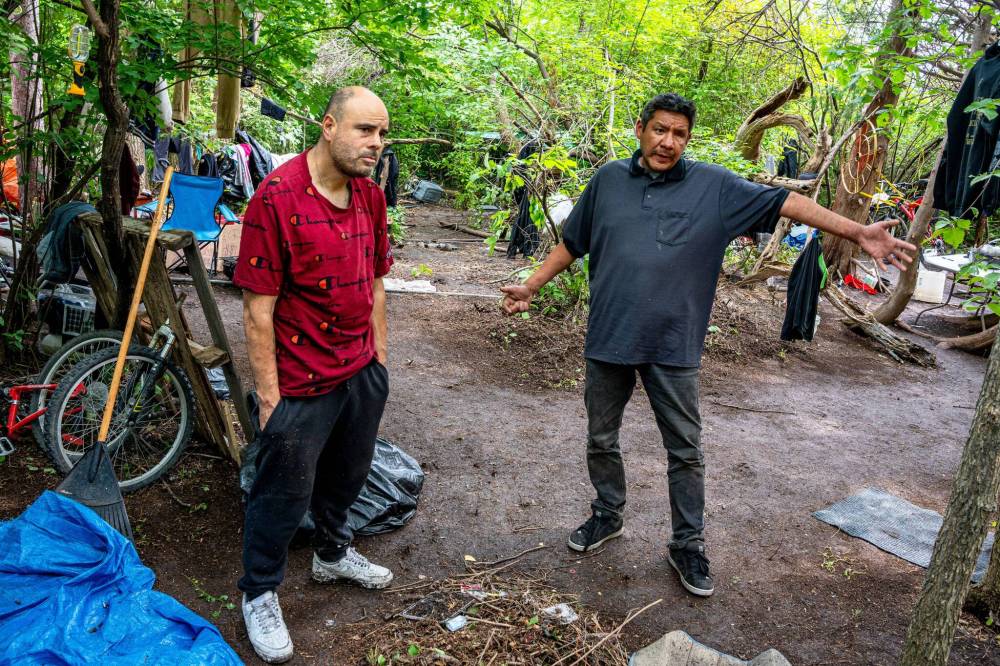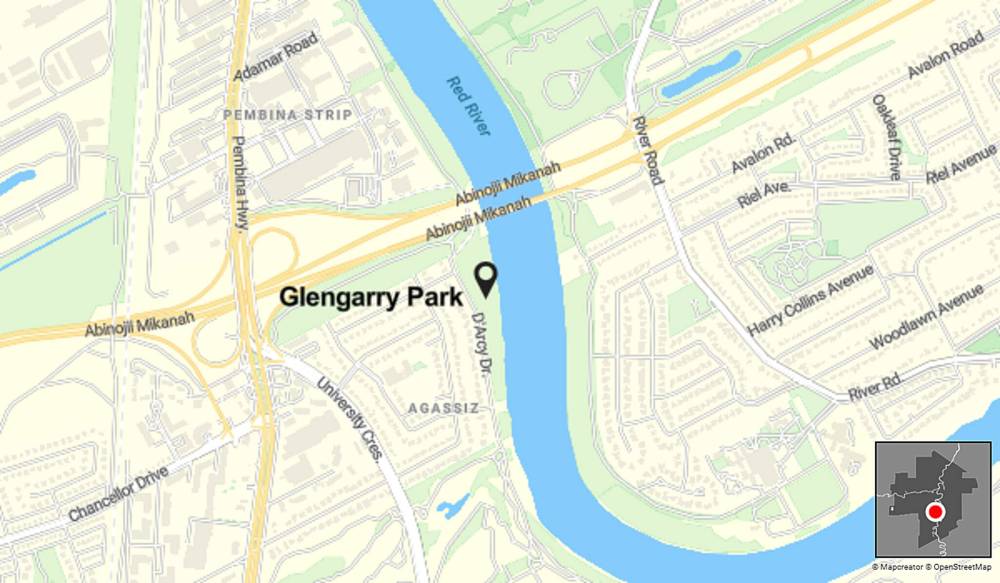An encampment at a park in Southwood became the site of conflict between two non-profit organizations that support Winnipeg’s homeless population when they clashed over how to help the people who were staying there last month.
Coun. Janice Lukes, who represents the area, said her office called St. Boniface Street Links for support with the camp near Glengarry Park on D’Arcy Drive, but the group disagreed with Main Street Project about how to deal with the issue.
“We had Street Links go in, work with the encampment folks to get their names, their social insurance numbers, their ages, and had them all agree to actually having Street Links help them find a place to live. When all of this was going down, a team of folks from Main Street Project showed up and said, ‘Well, you don’t have to leave. You’ve got rights to stay here if you want,’” Lukes told reporters Wednesday.

NIC ADAM / FREE PRESS
Chris Baron (left) and Alan Urrutia talk about the dispute between Street Links and Main Street Project, who are at odds over an encampment on D’arcy Drive.
“So there was a big scenario that unfolded. It wasn’t ideal.”
The site is nestled in the trees in the park along the Red River, south of Abinoji Mikanah (formerly Bishop Grandin Boulevard). People have stayed in the park off-and-on for about three years.
Alan Urrutia,who has been staying at the camp for roughly two months, was one of the four people living at the site who refused help from Street Links.
“They’re giving us broken promises (about housing),” he said. “I said ‘I’m not going anywhere, I know my rights, this is my land.’”
Chris Baron also refused to leave the camp. He’s lived there for four months.
“Main Street Project is here every day, giving us water and supplies … then Street Links swoops in and think they can kick us out of our camp?” he said. “They came in here and they asked if they could take our stuff because they assumed we all wanted to go.”
Lukes said she was “frustrated” by the situation and called it a case of two organizations operating “under different philosophies and different approaches.”
“From what I’m seeing, when one organization goes in, (they ask), ‘Do you need coffee? Do you need some food?’… Another approach, that I’m seeing from Street Links, is they go in, (and say) ‘OK, we’re going to try and house you, we’re going to try and find some accommodation, we’re going to try and get you some supports’… everything was loaded up in carts, people had agreed to move on to some form of housing that Street Links had found,” she said.
One person living in the encampment accepted temporary housing from Street Links, but Baron and Urrutia said they prefer to live along the river. They say the non-profit only provides temporary housing and the housing that is offered is sub-optimal.
“I’m not degrading Street Links, it would be great to be housed, but just not with them,” Baron said.
Street Links head Marion Willis declined to comment on the incident itself, but confirmed the groups had met to discuss the encampment, and said everyone was working toward the mutual goal of keeping homeless people safe.
“We are going to have to find our way to working together, all of us. You have to realize, there is no wrong approach. Nobody’s wrong, everybody’s right,” she said.
“Now, let’s just figure out how to take all these different right approaches, let’s all get together here and figure out how we form a plan and have a well co-ordinated strategy going forward.”
The camp has become an out-of-sight, out-of-mind issue, said one resident who lives across the street from it.

Guy, who declined to give his last name, saw the Street Links team descend on the camp and exit with multiple shopping carts filled with garbage.
He says without a proper strategy from the municipal government, the camp will remain.
“Janice (Lukes) has been here, but the honest truth is I don’t think she has an answer for it,” he said. “The city has kind of washed their hands of it.”
Main Street Project spokesperson Cindy Titus did not comment on the incident but said the organization follows the city’s encampment processes and the Kikinanaw Oma Strategy to support homeless Winnipeggers, “both of which take a human rights-based approach to supporting community members.”
“We take our role in supporting the community and upholding human rights in our work very seriously,” she wrote in an email. “We are always willing to support any councillor or other community member looking to better support the unsheltered community in Winnipeg.”
Mayor Scott Gillingham went to Houston last year to learn more about the Texas city’s housing-first approach in which 30,000 homeless people have been housed since 2012. The Free Press visited the city earlier this year, and leaders in Houston cited co-ordination between all groups that address homelessness as key to their success.
Lukes said the city is working on a similar approach that would prevent such disagreements from taking place.
— with files from Joyanne Pursaga
malak.abas@freepress.mb.ca
nicole.buffie@freepress.mb.ca

Malak Abas
Reporter
Malak Abas is a city reporter at the Free Press. Born and raised in Winnipeg’s North End, she led the campus paper at the University of Manitoba before joining the Free Press in 2020.

Nicole Buffie
Multimedia producer
Nicole Buffie is a multimedia producer who reports for the Free Press city desk.
Our newsroom depends on a growing audience of readers to power our journalism. If you are not a paid reader, please consider becoming a subscriber.
Our newsroom depends on its audience of readers to power our journalism. Thank you for your support.